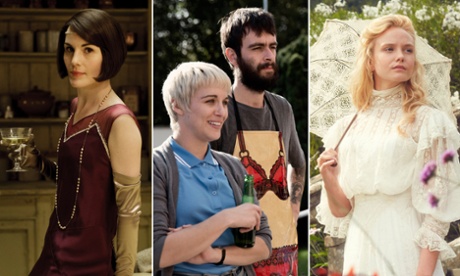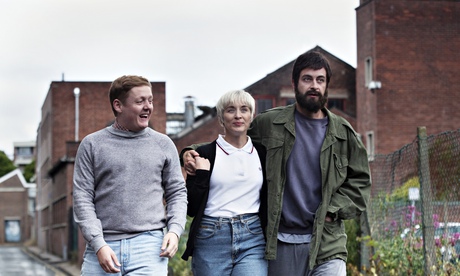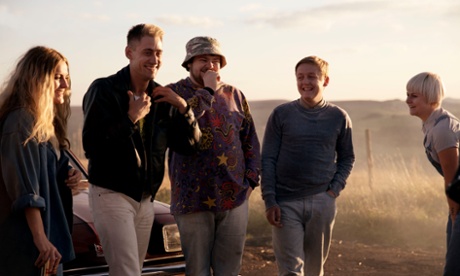The first episode of the espionage thriller Deutschland 86 contains as many time-checks as a breakfast radio show. A character who mentions an old incident is told: “That was 1983 – it’s been three years!” Someone else who brings up the past is admonished: “You’ve been away three years. You’ve no idea how things are now!”
This clock-watching dialogue underlines a dead giveaway clue in the title. Deutschland 86 is, of course, a sequel to Deutschland 83, which became the most-watched foreign-language drama in UK TV history, with 2.5 million viewers, when it aired in 2016. And fans of this smart, dark dramatisation of the final phase of the uneasy co-existence of democratic west Germany and its communist-ruled eastern neighbour can already look forward to Deutschland 89. The drama was always planned by its creators, Anna and Joerg Winger, as a trilogy heading for the fall of the Berlin Wall.
Deutschland is a flag-bearer for the increasingly popular genre of time-jump TV. Whereas drama of the past was often set in a generalised present day – the era identifiable only from haircuts and car number plates – the separate seasons of many recent shows are as date-stamped as food in a supermarket fridge. The Crown, Stranger Things, Endeavour, Call the Midwife and Downton Abbey are among recent hit shows which, like an unusually proactive policeman in an old film, keep telling people what the time is.
By placing the date in the title, Deutschland mimics the model of This Is England, which followed a group of young people through three seasons identified by the suffixes 86, 88 and 90. As the show was director Shane Meadows’ televisual extension of his film This Is England, the original movie is sometimes now classified for coherence as This Is England 83.
In moving forward at precise intervals, the Deutschland and This Is England franchises follow an internal time signature of almost musical regularity. In both cases, the start, end and re-entry points are dictated by political flash points. This Is England is always heading away from the 1982 Falklands conflict towards the fall of Margaret Thatcher’s government a decade later, with the last instalment pointedly located post-Thatcher.
Similarly, knowing that its target is a reunified Germany, Deutschland shapes the storyline around key events like President Ronald Reagan’s anti-communist rapport with Soviet leader Mikhail Gorbachev. Fascinatingly, though, the show also makes less familiar connections, including the little-known links between the simultaneous liberation struggles in east Germany and apartheid South Africa.
The American landmark in chronologically restless fiction is Mad Men. The advertising drama travelled from March 1960 to November 1970, but in irregular jumps, adding a layer of speculation about what had happened while we weren’t looking. Also, because some US events of that decade were so epochal, there was an extra tension for viewers in knowing the storyline was heading towards the JFK assassination, the Vietnam War and the Nixon presidency.
Downton Abbey, which moved from 1912 to 1925 across its six seasons, also planned its travel around big headlines: from the sinking of the Titanic the day before the opening episode, to the first world war and the 1918 influenza epidemic, to the election of a Labour government (which devastated many characters) in 1924. The eight series so far of Call the Midwife have covered eight years from 1957 to 1964, while Endeavour, across six sets of episodes, has covered just short of six years. Narratives that move through a time period are attractive to writers, because historical distance allows patterns to be seen among events that, up close, seemed unconnected.
But the biggest reason for the rise of the time-travelling drama season is the growing presence of shows set in the relatively recent past. Traditionally, most TV fiction has taken place either in a vague ‘now,’ where the clothes look fashionable but the prime minister is fictional, or a specific ‘then’, such as the 18th century of Austen adaptations or the 19th century of Dickens dramas.
However, with shows set within the living memory of many viewers, it is implausible to create a generalised recent past. Too many people remember what was on television and how new the cars, wide the flares or short the skirts were. As a result, not-long-ago projects have developed a keen realism about how things looked and sounded at the precise time being dramatised.
Influential in this respect were the time-slip police procedurals Life on Mars and Ashes to Ashes, created by Matthew Graham and Ashley Pharoah. Life on Mars was set, with atmospheric specificity, in 1973, while Ashes to Ashes was just as carefully located in the years 1981-83, taking in the Falklands war and Thatcher’s subsequent election victory, events that had also been pivotal in This Is England. Named after David Bowie hits of the relevant decade, Life on Mars and Ashes also advertised the possibilities of a period soundtrack, which has since become a standard feature of the genre.
In the first episode of the latest series of Endeavour, there was a tremendous sense, in the depiction of 1969, of the shock that the liberated fashions and attitudes caused to those shaped by the post-second world war period. Roger Allam’s bottle-it-up DI Fred Thursday and Simon Harrison’s let-it-all-out DCI Ronnie Box often seem to be in different TV shows, which is precisely the point.
For the recent raft of time-shift drama, resetting the clock has become so common that speculation about where the story will go next has become part of the pleasure of a season finale. The pattern established by Endeavour allowed us to guess that the seventh series, announced this week, will be set in 1970, bringing it tantalisingly closer to the world of Life of Mars, which, like DCI Box, knowingly evokes the 70s cop show The Sweeney.
The dates of the forthcoming third season of Stranger Things and the fifth and final run of Poldark are harder to predict. Stranger Things, so far located from 1983-85, seems a bold enough show to risk a greater leap next time. And Poldark has so followed Aidan Turner’s Ross from 1783 to 1799, the timeline of the first seven novels in Winston Graham’s books. However, the final five Graham stories move on events another 21 years, giving writer Debbie Horsfield, with only one series left, the chance, if she wishes, of vast acceleration.
And, for period dramas not working to a pre-ordained time scheme, the possibilities for sequels are potentially endless. Although Deutschland 89 will technically complete the series, admirers might hope, in time, for a post-Brexit Deutschland 2019, in which characters we first met in a Germany about to become one are living in a European Union that might contain one less country.











